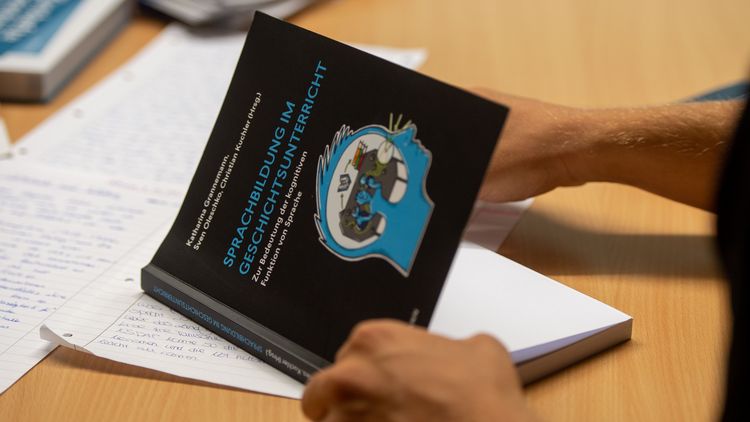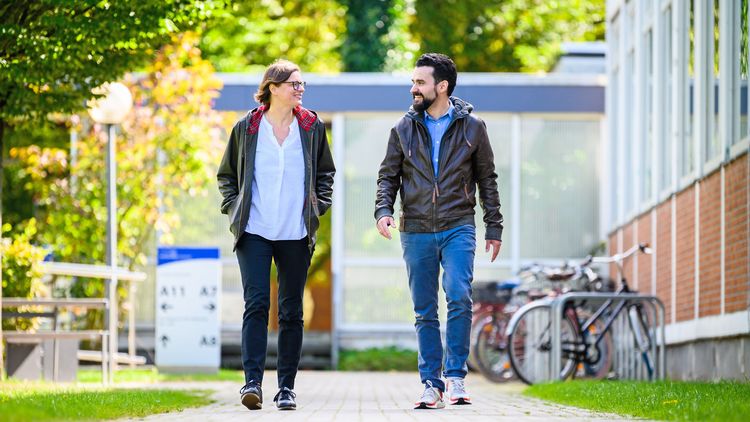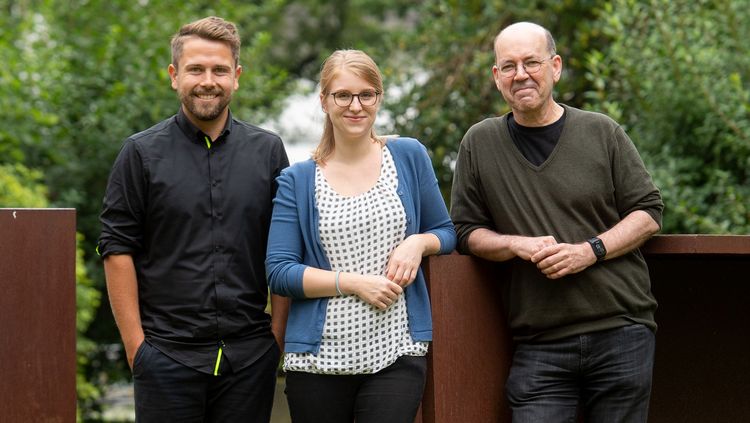Language plays a central role in schools as a medium for communication and education. Oldenburg researchers are examining how to train teachers in being sensitive about language.
It is almost twenty years since the results of the first PISA study caused a furore in Germany. Not only was the performance of German students below average, the most shocking finding was that in Germany, more than in any other country, educational achievement was linked to social background. According to the study, in particular children with an immigration background – something PISA links to certain socioeconomic criteria – have few chances of success in the education system. One of the main causes for this correlation was quickly identified: poor language skills.
Linguistic norms often remain implicit
But immigration-related multilingualism is not the determining factor in how well or poorly children and adolescents deal with linguistic challenges in the classroom, explains Juliana Goschler, Professor for German as a Second Language and German as a Foreign Language. The real issue, she says, is so-called “educational-language” skills. “The term “educational language” differentiates between the language spoken in everyday life and the language used in the classroom. And this linguistic register is not mastered by all students equally,” Goschler says.
Moreover, the linguistic challenges vary from subject to subject: “This can be a specific vocabulary, but certain subjects also use specific sentence structures or verb tenses,” she explains. History textbooks, for example, are often written in the simple past tense, which is never used in other subjects. In science subjects, on the other hand, you often find formulaic phrasing such as “To calculate x, we have to…” Such linguistic norms often remain implicit, Goschler explains. This not only makes it harder for pupils to understand the linguistic patterns and reproduce them, but also to learn the content of the lessons.
Sensitise teachers to the importance of language
Which makes it all the more important that future teachers of all subjects are sensitised to the importance of language in schools and lessons, Goschler says. “Teachers need to address the language they use for teaching and the language used in textbooks, they need to identify the language skills of their pupils and build on that, and finally they need to develop a critical and reflective attitude to language and language acquisition.” How to implement this was a key focus of Goschler’s 2014–2017 research project “Structuring Upheavals – Promoting and Teaching Language as an Integral Part of Innovative Teaching Training in Lower Saxony” (“Umbrüche gestalten – Sprachenförderung und -bildung als integrale Bestandteile innovativer Lehramtsausbildung in Niedersachsen”). One thing she learned during this period was that the linguistics perspective alone cannot account for and convey the linguistic challenges of the various subjects. “This is where the teachers of the individual subjects come in,” the linguistics professor says, “because they are the ones who best understand the teaching and learning processes particular to their subject.”
Since 2016, when the Department for Language-Sensitive Teaching and Learning (Arbeitsstelle Sprachsensibles Lehren und Lernen), which is run by Goschler, was set up at the Centre for Teacher Education (Zentrum für Lehrkräftebildung - Didaktisches Zentrum, DiZ), the University of Oldenburg has had an institution dedicated to this topic. A number of recently approved projects for professionalising teacher training have since picked up on this: as part of the project “Biographically-Oriented and Multi-Phase Teacher Education in Oldenburg” (”Biographieorientierte und Phasenübergreifende Lehrerbildung in Oldenburg – OLE+”), researchers from a number of disciplines are investigating the complexity of linguistic interactions in schools and other educational contexts. One focus area of the DiOLL project (Digitalisation in Oldenburg Teacher Training) is to investigate the challenges of language-sensitive teaching across the curriculum.
Language in learning contexts
In order to bring together the Oldenburg research on the topic and give it visibility, Goschler worked with Prof. Dr. Martin Butler, cultural studies scholar and head of the DiZ, to launch a series of publications entitled “Language Sensitivity in Educational Processes” (“Sprachsensibilität in Bildungsprozessen”). The first publication is a collection of articles edited by Butler and Goschler and titled “Language-Sensitive Teaching across the Curriculum. Interdisciplinary Perspective on Opportunities and Challenges” (“Sprachsensibler Fachunterricht. Chancen und Herausforderungen in interdisziplinärer Perspektive”).
“The articles by a number of Oldenburg researchers elucidate subject-specific, linguistic, educational and cultural studies perspectives on language in school learning contexts,” Butler explains. They examine language or text-related challenges in the classroom or the questions such as whether metaphors like “packets” or “clouds” make sense when it comes to learning in computer science classes. One article explains how practice-oriented lessons – in other words technology lessons based on specific exercises – can influence language-acquisition processes by creating opportunities for spontaneous, authentic communication.
The subjectivising effects of language in school is another topic. How the way we talk to each other organises and regulates social relations is examined here. How does continually being referred to as “pupils with an immigration background” affect the self-image of children and adolescents? “Language serves to categorise people,” Goschler explains. Every description we use invokes particular characteristics and stereotypes; it assigns people to a certain group or excludes them from it. Particularly when dealing with relations in an immigration society, it is important to further explore these dimensions of language and to sensitise students to this with a view to their future careers in schools, Butler adds.
Language-sensitive teaching in history lessons
The collection also includes an article by the Research Group for History Didactics, which is led by Prof. Dr. Dietmar von Reeken. There’s nothing new in saying that language is incredibly important for history as a subject, the historian observes. “This is because access to the past generally takes place through language, above all through available written sources or written descriptions of history.” In history didactics research, however, the role of language has never been explicitly raised as an issue. And history as a subject contains very particular linguistic challenges: “We don’t have language that is explicitly specific to the subject, as science subjects do, for example,” von Reeken explains. “Terms like king or citizen are familiar from everyday usage, but in historical contexts, they often have a very different meaning.”
So pupils have to constantly translate texts from historical language into everyday language. On top of that, in history lessons pupils are also meant to be developing narrative skills – in other words, the ability to understand history and to retell it – and of course “in a linguistically appropriate manner,” von Reeken stresses. This means that the challenge for teachers is not just to teach the subject matter of any particular subject, but also the linguistic skills that accompany it. The latter, the historian says, are not systematically included as part of the lesson. “It is somehow just expected that they will be learned along the way.”
Create new support frameworks
Sinje Eichner and Max-Simon Kaestner, doctoral students under von Reeken, are researching how teachers can help their pupils to acquire the necessary linguistic skills for studying history. Eichner is investigating the role of spoken language in school history lessons – a topic that has received little attention to date even though speaking is such a prominent part of history lessons. Kaestner is focussing on writing. For his PhD he has designed and evaluated a unit that aims to support pupils in writing historical assessments. “In linguistic terms, historical thinking is expressed in recurring patterns of words and phrases, known in German as Textprozeduren” he explains. An historical assessment takes the form of expressions such as “according to contemporary moral ideas” or “from today’s perspective”. In order to learn these Textprozeduren, pupils first work with text-models. “They analyse how Textprozeduren are used and reflect on how they demonstrate historical thinking. In the final step they practise writing argumentative essays themselves,” Kaestner explains. The historian has already assessed the efficiency of his writing instruction in a preliminary study.
If such support frameworks are to find their way into schools, von Reeken says, it is essential to embed the topic of language into teacher training. Goschler and Butler support this demand. While language-related modules have long been mandatory for student teachers in Berlin and North Rhine-Westphalia, other federal states have been slow to catch up. “The regulations governing Master’s degrees in Lower Saxony stipulate that the language issue must be addressed. But there are no education-policy rules specifying that this must be integrated into teacher-training modules. This has to change,” Goschler stresses. (nc)





